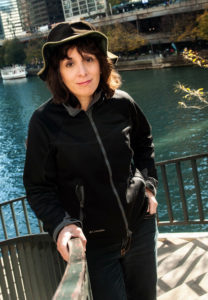January 6, 2018
The Unfairly Neglected Story of Algren
By Simone Malcolm
Q&A with reporter and author Mary Wisniewski

When most people think of American writer Nelson Algren, they think of the novel The Man with the Golden Arm, which won the first National Book Award in 1950, or as the lover of French writer Simone de Beauvoir, or as a “radical” due to his involvement in rebellious groups.
Award-winning reporter and member of the Nelson Algren Committee, Mary Wisniewski set out to tell a deeper story of the famed writer, whose been “unfairly neglected”.
As this year’s CWA Book of The Year Award winner for Traditional Nonfiction, CWA chatted with Wisniewski about the inspiration behind Algren: A Life and what inspired her to write her first book about the infamous writer.
What inspired you to write a biography on Nelson Algren?
I've been a fan of Algren since I was in college, and because I went into journalism in Chicago I kept running into people who knew him and had stories about him. I wanted other people to know about Algren — I think he's been unfairly neglected.
Who was your favorite person to interview for the biography? Why?
My friend Andy Austin — a courtroom artist I know from my journalism work who was friends with Algren. She not only gave me good stories but gave me the atmosphere of the artistic and literary scene in Chicago in the 1960s and 1970s. She also referred me to other Algren friends -- most importantly Suzanne McNear.
How does Chicago influence your writing or writing life?
I got interested in Algren when I was 19 because he was writing about the people I grew up with — Polish-Americans from Chicago's Northwest Side.
Tell us about the events that led to you writing Algren: A Life. What has been the most interesting?
I started collecting stories about Algren from people who knew him back in 2004. I was a long time at it, getting interrupted occasionally by having a child and family illness. One of the most interesting parts was going to the National Archive to retrieve his FBI file — which was over 400 pages long. I spent all day reading and copying it — amazed that the federal government would spend so much time and effort spying on a private citizen. I was grateful as a biographer — horrified as a citizen.
How long was the writing process for Algren: A Life? What kind of research did you have to do? What was the most challenging part?
Research was extensive and involved going into his personal papers at Ohio State University and at the Newberry Library, reading everything he wrote, and interviewing people who knew him. I went to the places he lived, and researched what they looked like at the time, and what the weather was like at the time of key events. I even went to his old high school so I could look at old year books. One of the most challenging parts was tracking people down, and finding out if they were still alive! I had just gotten Kurt Vonnegut's home phone number when I learned that he had died — which was very sad. It was also challenging getting permissions to quote letters he received or wrote — it's necessary to get permission from both Algren's estate and the person or estate of the person he corresponded with. This involved some detective work. Fortunately, most people were happy to help.
How does it feel to have your first book published?
It felt strange at first — I was almost afraid to let it go because I was working on it so long. Then I was happy to hear from people from all over the world who liked it and now want to read Algren again, or to read him for the first time. That was my goal — to get Algren better recognition.
In one sentence, what is Algren: A Life about? Tell me what interests you most about this book — or tell me other things besides books, that might constellate around it.
Algren was a hard-luck guy who wrote about hard-luck people and outsiders — and that's what the best of American literature has always been about. Literature is not about the winners.

Mary Wisniewski is a reporter and columnist at the Chicago Tribune. A former Reuters reporter covering Midwest crime and politics and a columnist for the Chicago Sun-Times, Wisniewski has won numerous awards for reporting, taught creative writing, and published literary reviews. Her new biography of Chicago writer Nelson Algren, "Algren: A Life," won praise from multiple publications, including the New York Times and Chicago Magazine, which called it "a captivating book that reads like a novel." She is an active participant in the Nelson Algren Committee, past president of the Chicago Headline Club, and appears frequently on local television and radio. "Algren: A Life" was awarded best biography for 2017 by the Society of Midland Authors and traditional nonfiction book of the year by the Chicago Writers Association.
Affiliates/Partners
Testimonials
Contact
Join CWA
Member Directory
My Account
Writers Conference
Presenters
Agents and Publishers
Pitch Sessions
Sponsors
Scholarships
Speaker Registration
Book of the Year
Spirit Award
First Chapter Contest
Resources
Home
Chicago Writers Association
info@chicagowrites.org
Make a Difference!

